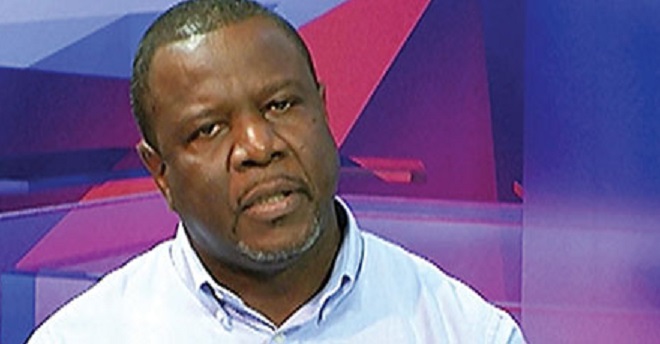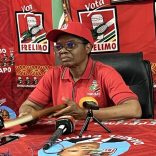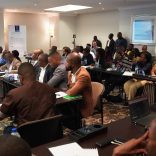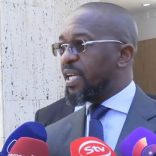Mozambique: Government says "very intensive" investigation into kidnapping of Portuguese ...
Watch: “Mozambique lives in an atypical governance” – Lutero Simango

O País / Lutero Simango, head of MDM's parliamentary bench
Born in Frelimo and now number two in the second largest opposition party, Lutero Simango opened his heart to STV’s Grande Entrevista (Big Interview) and talked about his political life. The following is an edited English version of the conversation as it was published in O País on September 7, 2016.
O País: Was it your father’s influence that led you to follow in his footsteps?
Lutero Simango (LS): Not only my father, rather the whole family I think, because his father was also an activist – with the local communities in Machanga [district in Sofala province]. My father’s grandfather also fought colonial occupation and was killed by the colonial army. When my father began to engage actively in politics, his father had already been arrested and was in the PIDE [colonial political police] cells. I think politics is a family trait.
O País: Do you remember any political perspectives that your father passed on which grew within you and dictated the direction of your political journey?
Lutero Simango (LS): The great teachings that I have retained and which today serve as the basis of my moral values are from his Mozambique Liberation Front meetings in Dar es Salaam, Tanzania. Sometimes he took me along and I saw them first-hand. And sometimes when he returned home after having been away a long time. He would be in uniform, still armed, and we children asked a lot of questions. What is this? What is that? But we knew what was happening: a revolutionary struggle in Mozambique.
Our house, in addition to being an accommodation centre, was also a transit point for people from various parts of the country. My mother was also very active at that time. She sometimes returned from conflict zones with orphans. So we knew that life is about struggle and, above all, respecting others, especially your elders.
O País: Looking at the circumstances in which your parents lost their lives, could it not have been family or personnel commitments that dictated your entering political life, as a means to restoring your parents’ memory?
LS: There are various interpretations, because both my father and my mother always had their ideals. When they came to Tanzania from Southern Rhodesia (now Zimbabwe), they left already as a family, with the minimum conditions for starting a social life. My father, besides being a Presbyterian pastor, was also a teacher. However, his departure to Rhodesia was a way to make the commitment he had with the homeland. Him going to Tanzania was through Udenamo and, having come to this country, he founded the Liberation Front of Mozambique with his partners and was one of the leaders of the whole process. However, my engagement in political life is of course, above all, a commitment that I personally feel. I have learned to love and serve others. But of course there is always the father’s or mother’s ‘rib’, which is very normal in politics.
O País: Do you remember any outburst or annoyance your father shared with you or your family?
LS: When we were in Tanzania we were very small, but at some point we realised things. We understood more when we were in Cairo (Egypt), when we were told more. All this is documented in a document that my father wrote about the gloomy situation within the “Front”. There he expressed all of his feeling about what was happening in the movement.
O País: What would you highlight from the document?
LS: When we see what is currently being experienced, especially the crisis and the political and military situation in the country, and about the direction of the development of the country, whether it should have followed a socialist or a capitalist orientation, we note that the problems pointed up in that document still persist. The issue of regionalisation of Mozambique and the orientation of the country’s development. When we speak of the conflict, though latent, between the south, centre and north of the country, this document is very detailed. The question, in fact, lies in the leadership, the elites. How can one accommodate the elites from all regions of the country? The second aspect is related to the economic direction of the country.
From PCN to MDM
O País: In 1992, the signing of the Comprehensive Peace Agreement created conditions for multiparty democracy. Lutero Simango later created the National Convention Party [PCN]. What led to its creation?
LS: The mentors were a group of individuals encouraged by Vasco Campira Mamboia. At the time we were all convinced that a multi-party democracy process was going to start and that it was necessary to have a voice in the process and revive the dream of many Mozambicans who had always believed in a democratic, multi-party country. It was in this perspective.
O País: And when the MDM was created eight years later did you see yourselves reflected in their ideas? And how were they aligned with those of your party?
LS: When the MDM was created, we felt it was there that we had the largest political force and could all engage and make a constructive contribution. In African countries, in Mozambique in particular, change is only possible through political work. That is why we all came aboard this great project that is the MDM, which managed not only to bring Mozambicans together but converge on a single platform.
O País: Today you are the head of the parliamentary group of the MDM. Is become leader one of your ambitions?
LS: Every politician has his or her perspective, but for the sake of the stability of an organisation and for the achievement of a common agenda, I am based in the MDM and we have a common agenda. My political ambitions are to participate in a process that can give real happiness to the people of Mozambique.
O País: Do you consider reaching Ponta Vermelha (the presidential palace)?
LS: I do not consider it, yet.
O País: Your appointment as head the parliamentary group has generated some discontent within the MDM because you are the brother of the MDM president and a member of an electoral district that elected the fewer deputies. How do you respond to these criticisms?
LS: In my political life, I have learned to be disciplined, because political parties that are oriented towards party discipline triumph. Despite being the brother of the president of the party, I am also a politician. I have my career and everything I have achieved at the political level was on the basis of my own work and its merits. And above all, I always believe that teams win. I am part of a team.
O País: MDM has preached the alternation of power, but in the party it shows very little. Is it truly a democratic party?
LS: Political parties are guided by the functioning of their organs in accordance with their statutes. Every five years we have a congress and the congress defines the guidelines of the functioning of the party, and what the congress decides, it is the responsibility of other agencies to enforce in a democratic manner. Congress is held, and congress sets the rules, approves the program and elects the president; the national council and the others are required to fulfil the decisions taken and, in that light, the party is functional.
O País: For the next local elections does the party equate a new candidate?
LS: The second congress has been called and will take place next year, and this congress is where we will define the profile of our candidates.
O País: What should be the profile of the next candidate for the presidential elections?
LS: There are several ideas. We will reflect and the governing body, Congress, will know how to decide according to its competencies. But for me, the candidate must be the one member able to lead us to victory.
O País: Given that candidate Daviz Simango had a ‘bad’ result in the last presidential elections, in the sense that in 2009 he had about eight percent and in 2014, the same percentage?
LS: We had atypical elections and today we have atypical governance and are living in an atypical economy. In the 2014 elections, two of the parties controlled armies. One party had its army and the other controlled the state army and police. [These elections] where the two other parties had the means to fund their campaigns. And today we speak of an ongoing dialogue and all Mozambicans are being excluded from.
O País: The results obtained in the last election were also atypical. MDM went from eight deputies to 17, was that also atypical?
LS: We had good results in 2013 in the municipal elections, which scared ‘the system’. In the 2014 general elections the MDM was pressed on both sides and managed to survive. That is why I call the 2014 elections atypical.
O País: Internally, how did the MDM assess its participation in the elections?
LS: A campaign needs financial resources, and we, as a party, did not have the means available for a quality election campaign. As a party, we have to fight for more resources so that there is a quality campaign and we can get the desired results.
O País: What is the mobilising factor in the MDM?
LS: We have youth. We have a vision of Mozambique for all, a Mozambique of inclusion. The country does not only belong to the liberators, much less those who gave birth to democracy, but to all Mozambicans. This is a Mozambique for all, and each had his or her opportunities according to his or her time. You can not ask a 25-year-old to have participated in the national liberation struggle. Or require a 21-year-old to have participated in the struggle for democracy. This is why we have a vision of a Mozambique for all.
O País: The MDM is a young party, but already it has dissidents. Does that worry you, considering your origins?
LS: It is a dynamic process all political parties go through. It is a normal process that will always happen. It is necessary that we, as MDM, reflect so as to prevent it from happening again.
O País: What is the political line of the MDM?
LS: When we talk to the people it is hard to explain what ‘left’ or ‘right’ are. Our people want a government capable of solving their basic problems. Obviously we as MDM are a party of the centre-right. We defend the values of the market economy and life. We have the human being as the centre of our action, a Constitution which guarantees the separation of powers, democratic values and we recognise the existence of God. We only exist because God is there, that is a difference between our party and the others.
O País: And what is the MDM strategy for gaining power and what is the expected time frame?
LS: The strategy is working. And we are working. The strategy is to consolidate what we have already achieved, and we are doing it. However, the whole strategy necessarily goes through a political process and that is what we are doing and will always do.
O País: Looking at the next elections, if the MDM is unable to reach a majority in parliament, will it look for a coalition partner?
LS: We will have to wait and see.
O País: But are you open to the idea?
LS: Of course. We have always been open, even in the current legislature. Now, this question should be put to the other side. Are they open or not?
O País: How do you see parliament, from the point of view of discussing matters of national interest, and the quality of the debate?
LS: I said at the beginning of the interview that we are experiencing an atypical period, and this situation is affecting the functioning of parliament. Being in an atypical environment, obviously the debates we witness every day are, if not about the war, about violence, if not about violence, about something else, but always something other than where we should be focusing, which is on the overseeing of government activity.
O País: How have the MDM’s international relations been?
LS: The MDM’s international relations are very acceptable. In addition to delegations here in Mozambique, MDM has delegations in neighbouring countries and in Kenya, Portugal, Germany, Spain, France, Holland and Italy. We have many friendly parties with whom we are cooperating, so international relations are good.
O País: How does MDM interact with other opposition parties in the region, to gain advantage by exchanging experiences?
LS: There have been some seminars and exchange-of-experience platforms and obviously political coexistence has its vitiation so the MDM will have to learn from new experiences, since each country has its own particular reality.
O País: If you received an invitation from Frelimo to become a militant, would you accept it?
LS: At my age I no longer have the “leather” to change parties or create another party. So it’s MDM to the death!
Political dialogue
O País: The MDM has demanded inclusion in the political dialogue process. What kind of participation are you demanding?
LS: We have to have an equal share, because the dialogue that we advocate has to be inclusive. The MDM is represented in Parliament and in addition to this, it governs four counties, and is represented in all provincial assemblies. It is only fair that it be represented.
O País: What would be the agenda points?
LS: Obviously it would be the inclusion agenda and the revision of the constitution; establishing the constitutional provisions and revisiting the policy of decentralisation. Governors must be elected. We must avoid the mistakes of the past, seeing Frelimo as the legal representative of all Mozambicans. Today there is a tendency to gravitate around the debate between the two main parties, which is wrong. The question of peace is a national imperative.
O País: What would be the MDM’s position on the four agenda items already on the table?
LS: MDM has been clear. First you need to cease hostilities. People at this time are not producing. The argument would be about persuading the warring parties to find a solution to this conflict, because Mozambicans need peace.
Regarding the governance of the six provinces, we defended the appointment of provincial governors, through proposals coming from the provincial assemblies. These would send three names and the president, through the powers conferred upon him by law, would choose one of the three. When it comes to Manica and Nampula, the MDM should be consulted because we are the ones who make a difference – neither Renamo nor Frelimo can form a majority without our participation.
As regards the two other points, we advocate that the defence and security forces must be purely ‘Republican’. Renamo men should be integrated, but this process should be done with deadlines and framework limits. The demilitarisation of Renamo is solved easily, but above all there must be trust.
But first of all you need to look at the causes in order to solve the problem, because without revisiting the causes, we will have no way to resolve the conflict, but will just postpone the ultimate solution to the next generation.













Leave a Reply
Be the First to Comment!
You must be logged in to post a comment.
You must be logged in to post a comment.